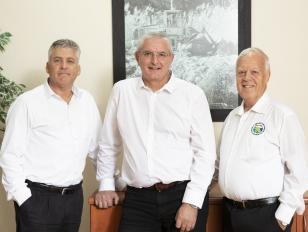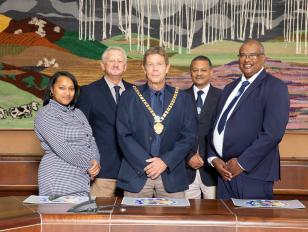
Best Municipal Project
This Category recognises a Municipal Project/Team visibly demonstrating commitment to resident-centeredness, performance excellence and Good Governance Principles.

The Coastal Management project’s core function is:
- the cleaning of beaches;
- alien cleaning;,
- assisting with Red Tide incidents; and
- monitoring and control of Bird flu pandemic and reporting and removal of dead seals.
The project contributed to environmental management, education and waste management.
It also created environmental investment and job opportunities in the Elands Bay and Papendorp areas.
The West Coast District Municipality’s excellent coastal management work was acknowledged in local media outlets, and meets the Provincial Priorities of Jobs, Safety and Wellbeing.

Swartland Municipality has changed to an automated building plan submissions process, to create an enabling environment for investment and employment opportunities. Building plans are subjected to a pre-submission process, with a specified timeframe, within which all town planning and land use aspects are addressed. Building plans may only be officially submitted on our building plan portal once all issues have been resolved. The pre-submission check prevents submitted plans from being delayed in the system. Communication is electronic and immediate which eliminates long delays between comments and responses. Constant interaction and flow of information between the Municipality and its clients enhance the confidence of investors in the area, as it is evident that the administrative systems are effective, yielding returns due to shorter turn-around times. The faster building plans are approved, the more rapidly construction can commence, creating job opportunities.
The Red Tape Reduction Programme is considered sustainable on several levels and system operates electronically, thereby creating a paperless environment.

The Highlands Landfill and Material Recovery Facility creates job opportunities for skilled, semi-skilled ,and unskilled persons providing training in the field of waste management.
The project supports everyone’s right to a clean and healthy environment. It also encourages sustainable environmental practices in diverting waste from landfill and increasing recovery of materials to re-enter the value chain.

The Oostenbosch Street project forms an integral part of the development of mobility routes for all modes of traffic internally between the various residential and business hubs, including public transport. It serves as a much needed connecting route to and from the industrial areas surrounding the corridor and providing efficient and economical transport routes. The upgrading of the road provides for opening the transport network between the eastern and western sections of Paarl. It also provides the Drakenstein area with efficient and improved access to the economy (business and social).
To eradicate increasing vandalism and theft of traffic light installations, the municipality had to become innovative, by storing its equipment for traffic signals in an underground chamber. This initiative is unprecedented in Africa, whereby the UPS, batteries, controller, and other equipment for traffic signals are stored in underground chambers. These chambers were developed in collaboration with Smartlock Systems and are equipped with alarms that can detect attempts to gain unauthorised access. To facilitate work on the equipment, it can be hoisted above ground level, to allow user input and maintenance. The chambers are vandal proof and access is controlled, electronically. The project eradicate vandalism and interrupting of services.
The upgrading was done to a four-lane divided road which is sufficient to accommodate the existing and future traffic volumes. It must be mentioned that this project provided increased off-road facilities to accommodate greater non-motorised traffic across the Berg River divide, enabling extensive economic and social integration.

The Swartland ECD Forum follows an approach that is guided by the Swartland Social Development Policy, National Norms and Standards (Chapter 5 and Chapter 6) as set out in the Children’s Act 38 of 2005.
The ECD forum is sustainable, and the project implementation is done collectively through partnerships with various stakeholders such as:
- the Department of Social Development;
- Department of Education;
- West Coast District Municipality;
- Grassroots;
- the Swartland ECD Forum; and
- the Swartland Social Development Forum.



